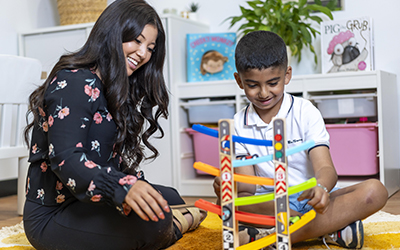Your guide to understanding the process and supporting your child’s communication journey
Starting speech therapy for your child can come with a mix of emotions—hope, uncertainty, maybe even a little nervousness. Whether you’ve just booked your first appointment or are considering it, knowing what to expect can help you feel confident and prepared.
Here’s a breakdown of what typically happens during a speech therapy session:
1. A Warm Welcome
Your child’s therapist will start by creating a comfortable, friendly environment. Building trust and rapport is key—especially in the early sessions. Your child might not even realise they’re “working”—it may just feel like play!
2. Tailored Activities Based on Your Child’s Goals
Speech therapy isn’t one-size-fits-all. Every child’s plan is personalised. Depending on their needs, the therapist might focus on:
- Speech sounds (e.g., helping your child say “s” or “r” more clearly)
- Language skills (like following directions, answering questions, or building vocabulary)
- Social communication (such as taking turns or making eye contact)
- Fluency (supporting children who stutter)
- Early communication (like using gestures or sounds for toddlers)
Therapists use evidence-based activities that are fun, engaging, and just right for your child’s developmental level.
3. Lots of Play!
Play is how children learn best—and speech therapists are experts at using play to build communication. You might see toys, books, bubbles, games, or songs. Each activity is chosen to target specific speech or language goals in a way that keeps your child motivated.
4. Modelling and Encouragement
The therapist will model words, sounds, or sentences, encouraging your child to join in. They’ll gently guide your child to practice new skills while making it a positive, rewarding experience.
5. Parent Involvement and Feedback
You’re part of the team! At the end of each session, the therapist will share what they worked on, how your child responded, and what you can do at home to support progress. You might also receive simple strategies to use during everyday routines (like mealtimes or bath time).
6. Progress Tracking Over Time
Speech therapy is a journey, and progress looks different for every child. Your therapist will monitor your child’s development and adjust goals as they grow and improve. Some children need short-term support; others benefit from ongoing therapy.
Final Thoughts
Speech therapy is about more than just talking—it’s about helping your child connect, learn, and be understood. Whether your child is just starting out or continuing their journey, our goal is to make each session positive, purposeful, and personalised.
If you have any concerns about your child’s communication or want to learn more about our services, we’d love to chat.


